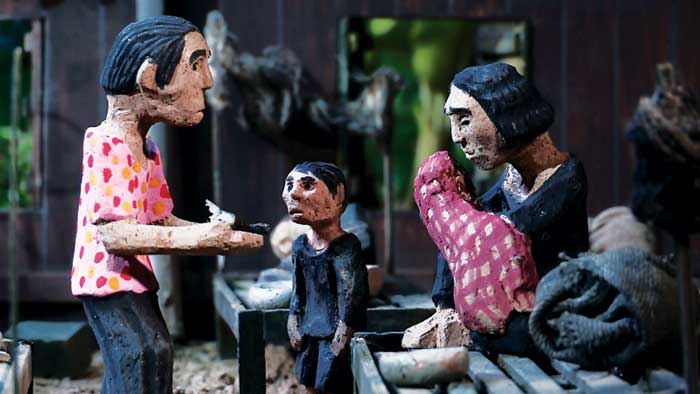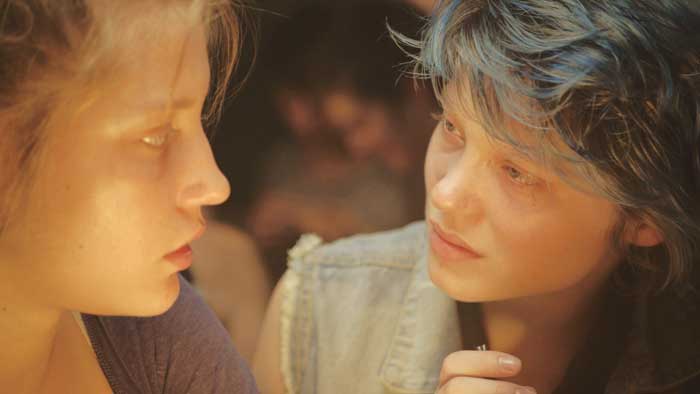Each month, the Indie Prof reviews a current film in the theater and a second film that is available on DVD or an instant-streaming service.
Follow “Indie Prof” on Facebook for updates about film events and more reviews.
The Missing Picture (2013)

Scene from The Missing Picture
Sometimes art and poetry can tell a story more realistically than documentary images. Cambodian Rithy Pahn’s wonderful film The Missing Picture, nominated for Best Documentary Feature at this year’s Oscars, is one such example. The film is a mélange of scratchy video footage, clay figurines in elaborate dioramas, and lyrical, poetic voice-over. The result is a fascinating experiment in documentary film that is both illuminating and invigorating.
Pol Pot and the Khmer Rouge were responsible for the deaths of more than 25 percent of the Cambodian population from 1975–1979. When they took over the country, they forced everyone out of the cities and into the country; they burned down houses so nobody could return; they forced everyone to work in agrarian labor camps; and they made “re-education” mandatory, from which a pure and classless society would emerge (in their eyes). The reality is that millions were tortured and/or died of starvation in the jungles of Cambodia, and the entire society eventually fell apart.
Rithy Pahn was in one of those families forced out of Phnom Penh and into the countryside. He lost his father, mother, and sisters; he was the only person in his family to survive, and he finally escaped to Thailand in 1979. He and his family, like most of the other Cambodians, lost everything they had: their homes, valuables, family heirlooms, and pictures. The “missing picture” of the title speaks to his efforts to fill in the story of his past, and in the process, the story of his nation’s past. The clay figurines substitute for the missing images.
The film is an absolute revelation gushing with poetry and poignancy. The surviving documentary footage is littered with state-sponsored sap and stacked with “happy” workers and energetic party rallies reminiscent of Leni Rifenstahl’s Nazi-propaganda films. The figurines and dioramas are correctives to that footage, serving as reality checks and as images burned into the memory of a survivor. The beautiful voiceover is reminiscent of the great Night and Fog, the documentary that first brought the world images of the Holocaust in the 50s. The end result is the chronicle of a sad chapter in world history and a cathartic exercise for one artist and, hopefully, many fellow Cambodians.
Now playing at The Chez Artiste.
You will like this film if you enjoyed Night and Fog, Saving Face, and/or The Art of Killing.
Blue is the Warmest Color (2013)

Scene from Blue is the Warmest Color
This French film from director Abdellatif Kechiche is the story of a young girl, Adele, who is growing up and wrestling with her sexuality in the midst of high school pressures and friends. She dates boys but she doesn’t find satisfaction in a relationship until she meets a blue-haired girl named Emma. Emma sparks her curiosity and passion, and the two embark on a stormy relationship that tests family, friendship, and fidelity.
The film won the Palme d’Or at Cannes, and it is sometimes graphic and sexually explicit. But most of all, it is honest and heartfelt, showing the raw emotions of young women going through dramatic changes and finding their place in the world. Rarely do we get to see a film with such honesty and intensity, and rarer still is the portrayal of young women dealt with so eloquently.
The cinematography is beautiful—utilizing close-ups for intimacy and then long takes that allow the action to sit with us. The use of handheld camera for the majority of the film also gives it an immediacy and realism that speaks to the subject matter. The acting is the revelation, however, and in particular, Adèle Exarchopoulos as Adele gives a star turn. Kechiche knows how to direct actors, and he knows where to place the camera on them for maximum effect.
This is certainly not a film for everyone: at three hours and with extended sex scenes, you need to know what you are getting into. It also requires some patience and understanding. The payoff is a film that is full of life, passion, and emotion. It is well worth the journey.
Available on the Netflix instant stream and VOD. You will like this film if you enjoyed The Hunt, The Broken Circle Breakdown, and/or The Great Beauty. This film, along with all other films I’ve reviewed, may be found at the Sam Gary Library. Look for the Indie Prof display at the end of the DVD racks.
Vincent Piturro, PhD, teaches Cinema Studies at Metropolitan State University of Denver. He can be reached at vpiturro@msudenver.edu.




0 Comments